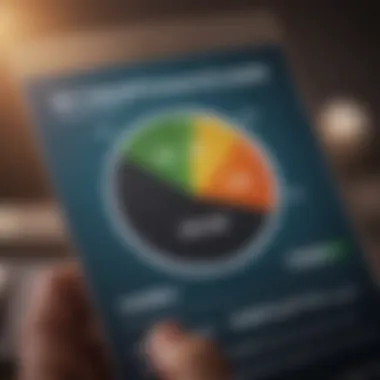Understanding Minimum Credit Scores for Refinancing Loans


Intro
Refinancing a loan is often a strategic move for individuals looking to optimize their financial obligations. However, many do not realize the significance of their credit status when considering refinancing. Knowing the minimum credit score required can be a crucial first step in this process. This guide offers insights into understanding credit status, effective strategies for improving scores, personalized recommendations for credit products, tax preparation tips, and actionable steps to enhance financial health.
Understanding Credit Status
What is Credit Status?
Credit status refers to the current standing of an individual's creditworthiness as evaluated by credit reporting agencies. This status is mainly determined by the credit score, which reflects the likelihood of an individual repaying their debts. Generally, higher credit scores translate to more favorable loan terms, including lower interest rates.
Key Factors Affecting Credit Scores
Several factors influence credit scores. The most significant include:
- Payment History: The record of on-time payments greatly impacts credit scores. Late payments can have a detrimental effect.
- Credit Utilization Ratio: This ratio indicates how much credit is currently in use compared to the total credit limit. Aim for a low utilization rate.
- Length of Credit History: A longer credit history can contribute positively to scores, as it demonstrates stability.
- Types of Credit Used: A mix of credit cards, installment loans, and other types of credit can favorably impact scores.
- Recent Credit Inquiries: Multiple hard inquiries within a short period can lower scores, as they signal increased risk to lenders.
Importance of Knowing Your Credit Reports
Understanding your credit reports is vital as these documents provide detailed information about your credit history and current standing. Identifying inaccuracies or old debts can help in resolving issues that may hinder refinancing.
How to Obtain Your Credit Reports
You can obtain your credit report for free from major credit reporting agencies - Equifax, Experian, and TransUnion. It is advisable to check your reports at least once a year to ensure accuracy. Websites like annualcreditreport.com offer this service.
Strategies to Improve Credit Score
Improving your credit score is essential for refinancing success. Below are strategies to enhance your creditworthiness.
Effective Methods for Boosting Credit
- Pay Bills on Time: Automating payments can help maintain a good record.
- Reduce Debt: Focus on paying down existing debt to improve your credit utilization ratio.
- Avoid New Hard Inquiries: Limit applications for new credit cards or loans.
Managing Existing Debt
Consolidate debt into one monthly payment or seek lower interest rates to expedite repayment. This can improve financial health and, subsequently, your credit score.
Importance of Timely Payments
Timely payments are crucial for maintaining good credit status. Even a single late payment can adversely impact your credit score.
Utilizing Credit Responsibly
Using credit wisely involves keeping balances low and making payments on time. Responsible credit use builds a stronger credit profile.
Personalized Recommendations for Credit Products
Assessing Your Financial Needs
Understand your financial goals before selecting credit products. Identifying the best options tailored to your situation is important.
How Recommendations Work
Credit product recommendations are often based on credit scores, financial behavior, and specific needs. This personalized approach ensures you get the best deals available.
Best Credit Cards for Building Credit
Some effective credit cards for building credit include Capital One Platinum Credit Card, Discover it Secured Credit Card, and OpenSky Secured Visa Credit Card. Each product offers unique benefits suitable for various financial situations.
Ideal Loans for Bad Credit
For individuals with low credit scores, options like secured personal loans from institutions such as OneMain Financial and LendingPoint may be relevant. These loans can help rebuild credit when managed properly.


Tax Preparation and Filing Tips
Key Tax Terms Every Individual Should Know
Understanding tax terms is crucial. Terms like
Prolusion to Refinancing
Refinancing can be a pivotal financial decision for many individuals. This process involves obtaining a new loan to replace an existing one, often with the goal of securing better terms. Understanding refinancing is vital as it affects both your current financial situation and future economic health.
The significance of this topic lies in its potential to reduce monthly payments, lower interest rates, and adjust loan terms. However, refinancing is not one-size-fits-all. It comes with its own set of considerations. Knowing when and why to refinance can set you on a path towards improved financial stability.
Definition and Purpose of Refinancing
Refinancing is the practice of replacing an old loan with a new one. This new loan usually has different terms including interest rates or payment schedules. The purpose of refinancing is multifaceted. It allows borrowers to manage debt more effectively, access cash through equity, and take advantage of favorable market conditions. In essence, refinancing can serve as a tool to enhance financial strategy.
Benefits of Refinancing
The benefits of refinancing can be substantial, depending on personal circumstances. Here are some key advantages:
- Lower Interest Rates: Many individuals refinance to benefit from lower rates, reducing overall loan costs.
- Reduced Monthly Payments: With better terms, monthly payments may decrease, improving cash flow.
- Changing Loan Terms: Refinancing provides the opportunity to modify the length of the loan, which can align better with future financial plans.
- Accessing Home Equity: For homeowners, refinancing can unlock cash for investments, renovations, or debt consolidation.
Ultimately, refinancing can serve as a strategic move towards better managing one’s financial landscape. Understanding the nuances involved is essential for making informed decisions.
Minimum Credit Score Overview
Understanding the minimum credit score required for refinancing is essential for anyone seeking better loan terms. This topic plays a crucial role in the refinancing journey because it directly impacts eligibility and potential savings. A higher credit score often leads to lower interest rates, which can result in significant financial benefits over time. Knowing the baseline credit score needed for refinancing helps borrowers set realistic goals and understand the steps necessary for improvement.
What is a Minimum Credit Score?
A minimum credit score represents the lowest score a lender allows for approval on a loan application. This score is typically based on models created by credit bureaus, such as FICO or VantageScore, which analyze a borrower's credit history, including payment history, credit utilization, and recent inquiries. The minimum score may vary depending on several factors, including the type of loan and the lender's specific requirements.
Lenders assess this score to gauge the risk of default. Therefore, it becomes a key indicator for lenders when deciding to approve or deny a refinancing application. Understanding what constitutes a minimum credit score helps applicants evaluate where they stand and what adjustments they may need to make.
Common Minimum Score Ranges
Minimum credit score requirements can differ based on loan type and lender. Generally, the following ranges apply:
- Conventional loans: A minimum score of around 620 is often required. This threshold can be influenced by the borrower's financial profile.
- FHA loans: These are more forgiving, usually requiring a minimum score of 580 for borrowers with a down payment of at least 3.5%. If the down payment is less than 10%, the minimum score might rise to 500.
- VA loans: Often, veteran borrowers can qualify with a minimum score of around 620, though some lenders can approve lower.
- USDA loans: Applicants are typically looking at a minimum score of 640.
It is relevant to note that having a score above these minimums does not guarantee approval. Lenders consider additional factors such as income, employment history, and overall debt levels. Ultimately, understanding common minimum score ranges supports applicants in determining their eligibility and future refinancing goals.
Factors Influencing Minimum Scores
Understanding the minimum credit score is only one part of the refinancing equation. It is essential to recognize that several factors work together to determine eligibility and interest rates. Addressing these elements allows potential applicants to better grasp what lenders consider when evaluating their finance applications.
Credit Type and Lender Requirements
The minimum score needed can vary based on the type of credit product. Different lenders have distinct requirements that reflect their risk tolerance and target market. For example, a conventional mortgage might demand a higher score than a government-backed loan, such as an FHA or VA loan.
Lenders like Quicken Loans or Wells Fargo often provide detailed criteria on their websites. Familiarizing with these specifics makes it easier for applicants to tailor their approach.
- Conventional Loans: Often require scores of at least 620.
- FHA Loans: Can allow scores as low as 580.
- VA Loans: Typically do not have a strict minimum, but a score over 620 is recommended.
By understanding these thresholds, applicants can choose their routes wisely, ensuring that they apply for loans fitting their profiles.
Current Economic Conditions
The wider economy is a critical factor affecting credit score requirements. During periods of economic stability, lenders may be more willing to lower their score requirements. Conversely, in times of uncertainty, they can raise these benchmarks to mitigate risks.
For instance, in the wake of the 2008 financial crisis, many lenders adjusted their standards to be stricter. Currently, factors such as inflation rates, employment statistics, and consumer confidence contribute to how lenders assess risks.
The economic climate directly shapes refinancing opportunities.


Tracking these trends is essential in determining when to pursue refinancing. Staying updated with economic news could give borrowers an advantage in timing their applications.
Loan-to-Value Ratio Impact
Another significant aspect is the loan-to-value (LTV) ratio. This ratio compares the loan amount with the appraised value of the property. Lower LTV ratios often appeal to lenders because they indicate less risk.
- An LTV of 80% or lower may qualify for better rates and terms.
- An LTV higher than 80% could lead to higher interest rates or require private mortgage insurance (PMI).
Balancing the LTV can lead to savings in the long run. Borrowers should consider strategies to increase home value or reduce debt before refinancing, as these steps can help achieve a more favorable LTV ratio.
Finale
Factors influencing minimum scores illustrate how multifaceted the refinancing process truly is. Borrowers equipped with knowledge of these aspects can improve their financial standing and refinance on better terms.
Refinancing Requirements Beyond Credit Score
Refinancing a loan often evokes questions about credit scores, yet it is crucial to recognize that other factors play significant roles in the approval process. Understanding refinancing requirements beyond credit score can heighten your prospects for success. Lenders evaluate a comprehensive profile of the applicant, and certain elements, such as income verification, debt ratios, and home equity, can be just as vital as a credit score.
Income and Employment Verification
Income and employment verification serves as a foundational element in the refinancing process. Lenders require evidence of steady income to ensure that applicants can manage new loan payments. This verification usually consists of pay stubs, tax returns, or employment letters. By confirming income stability, lenders mitigate risks associated with borrowing.
It is essential for applicants to maintain organized records of their earnings. A higher income can positively impact a lender’s decision, and having a reliable employment history can further bolster your application. This verification process helps lenders gauge the borrower's ability to repay, making it a critical requirement in refinancing.
Debt-to-Income Ratio Analysis
Debt-to-income (DTI) ratio analysis is another significant factor influencing refinancing. This ratio measures how much of a person's monthly income goes toward debt repayment. Lenders typically prefer a DTI below 43%, though lower figures are often more favorable. A robust DTI ratio indicates better financial health and suggests that the borrower can handle additional debt.
To calculate DTI:
- Add all monthly debt payments.
- Divide by your gross monthly income.
For example, if your total monthly debts are $2,000 and your gross monthly income is $5,000, your DTI would be 40%.
A higher DTI ratio may signal financial strain, potentially leading to loan denial or higher interest rates. Therefore, working to manage existing debts before refinancing is a sound strategy.
Home Equity Considerations
Home equity holds substantial weight in the refinancing equation. It represents the portion of the home you truly own, calculated by subtracting outstanding mortgage balances from the home’s current market value. Strong home equity can enhance financing options, often allowing for more extensive loan amounts or better interest rates.
Many lenders look for a significant amount of equity, sometimes requiring at least 20%. This assurance reduces risk for lenders by providing a cushion in case of market downturns. Homeowners who have built up considerable equity might also explore cash-out refinancing, which allows borrowing against home equity to pay off other debts or finance projects.
A clear understanding of home equity can empower borrowers, enabling more informed decisions as they navigate loan options.
In summary, while credit score is a critical factor in refinancing, other elements deserve equal attention. By focusing on income and employment verification, DTI ratios, and home equity considerations, applicants can enhance their overall profile. This multifaceted approach could lead to more favorable refinancing terms and ultimately improve financial health.
Understanding the Refinancing Process
Understanding the refinancing process is essential for anyone considering this financial strategy. It allows homeowners to lower interest rates, adjust loan terms, or consolidate debt. It can significantly affect one’s financial landscape, making grasping this process crucial. Knowing the steps involved and the necessary documentation can streamline the refinancing journey. This knowledge minimizes surprises and positions borrowers advantageously.
Steps in the Refinancing Journey
The refinancing journey begins with determining whether it is the right time. Here are the primary steps involved:
- Assess Your Current Loan: Review your existing loan's terms and conditions. Understand the interest rate and remaining balance. Determining if refinancing would actually benefit you is important.
- Check Your Credit Score: A strong credit score usually leads to better interest rates. It's vital to know your credit status before applying for a refinance.
- Shop Around for Lenders: Different lenders have various terms and rates. Take time to compare options rather than settle for the first offer. Look for lenders who specialize in refinancing.
- Choose the Right Type of Refinance: Decide if a rate-and-term refinance or cash-out refinance is more beneficial for your situation. Rate-and-term changes interest rates or loan duration, while cash-out allows accessing equity.
- Submit Your Application: After choosing a lender and type, fill out the application. Prepare to provide financial details.
- Review Loan Estimates: Lenders will give estimates that include rates, fees, and closing costs. Scrutinize these carefully before moving forward.
- Lock in Your Rate: If you are satisfied with the terms, lock in your rate. This protects against fluctuations while the process is completed.
- Close on Your Loan: Finally, finalize the refinancing at closing. Sign all necessary paperwork. Be ready to pay closing costs at this time.
Each of these steps requires careful consideration. Skipping any part can lead to unfavorable conditions.
Documentation and Requirements
The refinancing process necessitates specific documentation to ensure smooth processing. Below are critical documents you will typically need:
- Proof of Income: Recent pay stubs, W-2 forms, or tax returns confirm your income level and employment situation.
- Credit Report: Lenders will review your credit history to assess risk.
- Loan Information: Details about your current mortgage, including payment history and loan balance, are critical.
- Property Documents: Title deeds and tax assessments can affect refinancing terms.
- Personal Identification: Valid IDs or Social Security numbers are essential for verifying identity.


Collecting these documents beforehand makes the process faster. Missing paperwork can cause unnecessary delays.
Remember, understanding each step prepares you to engage in refinancing effectively. It impacts your financial future significantly.
Improving Your Credit Score for Refinancing
Improving your credit score plays a pivotal role in the refinancing process. A solid credit score can significantly enhance your eligibility for more favorable loan terms. By achieving a higher score, you open doors to lower interest rates and a wider range of refinancing options. This section discusses essential strategies and common pitfalls that could impact your credit score when seeking to refinance.
Strategies for Credit Improvement
To improve your credit score, you must implement effective strategies that focus on altering behaviors and managing debts. Here are some actionable tips:
- Pay Bills on Time: Timely payments constitute the most substantial portion of your credit score. Establish reminders or automate payments to ensure you are never late.
- Reduce Credit Card Balances: Aim to maintain your credit utilization below 30%. Lower balances can positively affect your credit score.
- Avoid New Debt: Each new credit inquiry can temporarily lower your score. Thus, it is best to delay opening new lines of credit while preparing to refinance.
- Check Credit Reports: Obtain free credit reports and review them for inaccuracies. Dispute any errors immediately, as these can unjustly lower your score.
- Diversify Credit Types: Having a mix of credit types, such as installment loans and revolving credit, can boost your score if managed properly.
Implementing these strategies requires discipline and commitment, but the payoffs in terms of refinancing benefits are well worth the effort.
Common Pitfalls to Avoid
While working on improving your credit score, certain pitfalls can hinder your progress. Being aware of these can make the difference:
- Ignoring Credit Report Errors: Failing to dispute errors can result in a lower score. Regularly check reports from all three major credit bureaus.
- Close Old Accounts: Closing old credit accounts can reduce your available credit and impact your credit history length. Instead, keep them open.
- Maxing Out Cards: Utilizing all available credit on your cards can lower your score. Aim to keep balances low.
- Not Planning for Hard Inquiries: Multiple hard inquiries in a short period can negatively affect your score. Space out credit applications to mitigate this risk.
- Neglecting Financial Obligations: Otherwise small bills can accumulate and lead to collections. Stay on top of all payments.
Improving your credit score is not an overnight endeavor. Consistency and mindful management of your financial behaviors are keys to success.
Ultimately, understanding both the strategies for credit improvement and common pitfalls to avoid forms the foundation for a successful refinancing experience. Taking these steps can help reinforce your financial stability and enhance your refinancing prospects.
Impact of Refinancing on Financial Health
Refinancing a loan is a significant financial decision. It can influence both immediate and long-term financial health in various ways. Understanding these impacts is essential for anyone considering this option. Refinancing can alter monthly payments, adjust interest rates, and even change the overall length of a loan. This section delves into the short-term and long-term benefits of refinancing, as well as how it affects credit scores after the process is complete.
Short-term vs Long-term Benefits
When refinancing, many are drawn by immediate advantages. The most obvious benefit is usually lower monthly payments. This can ease financial strain, providing extra cash for savings or other expenses. A lower interest rate can also reduce the total amount paid over the life of the loan. Instant savings may be a key motivator to move forward with refinancing.
However, it's essential to consider the potential long-term effects as well.
- Increased Total Interest Costs: Sometimes, extending the loan term to reduce monthly payments may result in a higher total interest paid.
- Future Financial Flexibility: A lower monthly payment means more room in a budget; this can allow for increased savings or investing opportunities.
- Impact on Financial Goals: For those seeking to purchase new assets or backgrounds, a better cash flow can make such objectives more attainable.
While the short-term benefits are tangible, they should be evaluated against potential long-term consequences.
Effect on Credit Score Post-Refinancing
Refinancing will likely influence a borrower’s credit score, often in different ways. Initially, a hard inquiry when applying may slightly lower the credit score. However, if refinancing is done wisely, the long-term effects on credit can be beneficial.
Some of these effects include:
- Lower Credit Utilization Ratio: A lower debt-to-income ratio may improve credit health, positively affecting scores.
- Payment History: If monthly payments reduce and are made consistently on time, this can bolster the credit score over time.
- Age of Credit Accounts: Closing older accounts post-refinancing can create a temporary dip in credit; however, keeping them active is usually favorable.
Refinancing has potential to enhance overall credit health as long as the borrower manages the new terms responsibly.
Final Thoughts on Refinancing and Credit Scores
Understanding the relationship between refinancing and credit scores is crucial for anyone considering this financial strategy. The final segment of this guide highlights important elements that can guide potential borrowers in making informed and strategic decisions. A solid grasp of the implications of refinancing can significantly impact one's financial health and future plans.
Making Informed Decisions
Making choices about refinancing should stem from a clear understanding of both the terms of the new loan and the borrower’s credit profile. It’s important to take into account several factors. For instance, knowing the current credit score, the new loan's interest rate, and how both fit into long-term financial goals is essential.
- Evaluate Your Situation: Before taking any steps, gather information about your existing loan and any potential new loans. Consider your income, credit history, and any upcoming financial changes.
- Compare Options: Look for the best rates and terms. Each lender may have different requirements based on credit scores, so researching various options is vital.
- Understand Fees: Refinancing often includes fees that can negate potential savings. It's crucial to weigh these costs against the benefits of securing a lower rate or altering loan terms.
Ultimately, well-informed decisions involve comprehending the full picture. It includes understanding how refinancing affects your overall financial health rather than merely focusing on short-term savings.
When to Consider Refinancing
Timing plays an important role when thinking about refinancing. Certain circumstances indicate that refinancing could be beneficial:
- Falling Interest Rates: When market rates decrease, refinancing can allow borrowers to secure a lower interest rate, reducing monthly payments and overall loan costs.
- Improved Credit Score: If your credit score has increased since you first obtained your loan, refinancing can provide access to better terms and more favorable interest rates.
- Change in Financial Situation: Life events such as a new job, marriage, or significant unexpected expenses can prompt a reassessment of financial obligations. Refinancing may present a way to manage these obligations more effectively.
- Adjusting Loan Terms: If you aim to alter your loan terms, either by switching from an adjustable to a fixed-rate mortgage or changing the loan duration, this is a valid reason to refinance.
Before making a decision, assess how these factors intersect with individual financial goals. Being proactive and utilizing the correct timing can aid in making refinancing a positive step toward better credit management and financial health.







